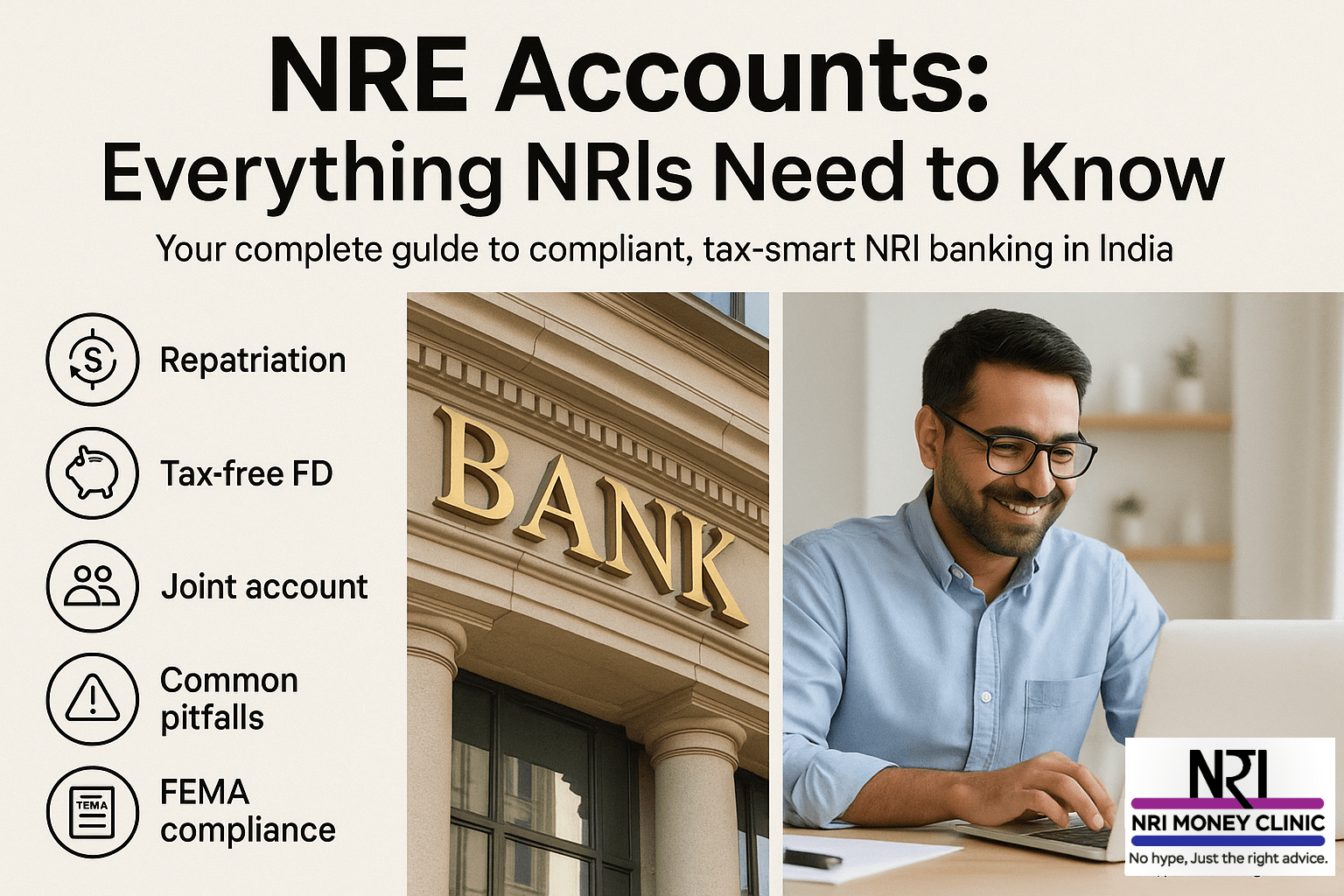Everything You Need to Know to Stay Compliant and Confident
If you’re an NRI, navigating Indian banking rules can feel like solving a Rubik’s cube blindfolded. There are multiple types of accounts—each with its own purpose, benefits, and restrictions. Among them, the NRE account (Non-Resident External) is one of the most commonly used—but also the most misunderstood.
At NRI Money Clinic, we often hear questions like:
“Can my Indian salary go into my NRE account?”
“Can I receive money from a friend into it?”
“Is the interest really tax-free?”
This article answers all those questions—and many more.
What is an NRE Account?
NRE stands for Non-Resident External Account.
It’s a bank account in India where you can deposit your foreign earnings. This account is held in Indian Rupees (INR), and the money must come from outside India.
Who Can Open an NRE Account?
You can open an NRE account if you are:
An NRI (Non-Resident Indian)
A PIO (Person of Indian Origin)
An OCI (Overseas Citizen of India)
A foreign national (in specific scenarios)
The account must be opened under FEMA rules, not income tax rules.
Types of NRE Accounts
Just like resident accounts, NRE accounts can be:
Savings accounts
Fixed Deposits (minimum 1-year tenure)
Current accounts
Recurring deposits
Important: Fixed deposits must be for at least 1 year. Anything shorter is not allowed for NRE FDs.
Joint Holding in NRE Accounts
You can hold the account individually or jointly
Joint holding is allowed with another NRI, PIO, OCI, or even a resident Indian
But with a resident Indian, it must be a “Former or Survivor” arrangement—meaning the resident can only access the account after the NRI’s death
How Can You Fund Your NRE Account?
You cannot deposit money from India directly into your NRE account. Here’s what’s allowed:
Foreign remittances from your overseas account
Transfers from another NRE account
Investment proceeds (if originally made using NRE funds)
Insurance maturities (if paid from NRE) — keep documentation
Repatriated Indian income — but only after paying tax and getting a CA certificate
What Can You Do With the Funds?
The money in your NRE account can be used for:
Paying for property purchases, mutual funds, or insurance in India
Loan repayments
Transfers to other NRE accounts
Repatriating funds back abroad without any permissions or paperwork
Best Feature: Funds in NRE accounts are freely repatriable — no CA certificate or RBI approval required.
Taxation on NRE Account
Interest on NRE FDs is tax-free in India
However, this may still be taxable in your country of residence. For example, NRIs in the US must report and pay taxes on this global income
Limitations & Disadvantages
Held only in INR — not in USD or any other foreign currency
Minimum 1-year tenure for FDs
You cannot receive money from a resident Indian or Indian income directly into it
Indian tax authorities can question large transactions
Salary paid directly to an NRE account from abroad is taxable in India
Instead, use your foreign account or a GIFT City account first, and then transfer to NRE
FAQs & Common Mistakes
Q: Can my employer deposit my foreign salary directly into my NRE account?
A: Technically yes, but this makes it taxable in India. Better to route it through a foreign bank or GIFT City account.
Q: Are transactions in NRE accounts immune from Indian tax scrutiny?
A: No. All bank accounts in India, including NRE, are subject to reporting and audit by the Income Tax Department. Keep records.
Q: Can I convert my resident savings account into an NRE account?
A: No. Resident savings accounts must be converted to NRO, not NRE. NRE accounts must be opened separately.
Q: Can I open an NRE account before I leave India for work abroad?
A: Yes. With proper documents (passport, visa, offer letter), you can open a zero-balance NRE account before departure.
Pro Tip: Keep Documentation
If you plan to repatriate funds or claim tax exemptions, always:
Save annual NRE bank statements
Keep proof of investments made using NRE funds
Store insurance payment receipts
Quick Question for You:
When you return to India and become a Resident but Not Ordinarily Resident (RNOR), can you still hold your NRE account? What are the consequences if you do?
Share your thoughts in the comments—we’ll answer this in our next article.
Need Help With Your NRI Banking?
At NRI Money Clinic, we simplify NRI banking and help you use the right account the right way. Want expert guidance? Just drop us a WhatsApp message—we’re here to help. https://wa.link/q8rw62


